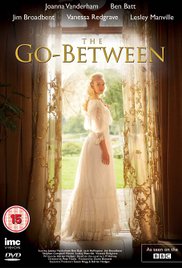
THE GO-BETWEEN
UK, 2015, 90 minutes, Colour.
Jim Broadbent, Jack Hollington, Joanna Vanderham, Ben Batt, Stephen Campbell Moore, Lesley Manville, Samuel Joslin, Vanessa Redgrave.
Directed by Pete Travis.
The 1971 film version of L.P.Hartley’s celebrated novel, The Go- Between, directed by Joseph Losey, is considered a classic. It starred Julie Christie and Alan Bates, with Dominic Guard as the young boy who was the go-between and Michael Redgrave as his older character. It was a period piece, re-creation of an era in English history, beautiful in its settings, costumes and decor.
Much of this is reproduced in this new version, made a television.It has been directed by Pete Travis who has had a varied career as a director, the portrayal of the atrocities in Omagh, the complex assassination thriller, Advantage Point, and a television Henry VIII, and a version of Judge Dredd.
Jack Hollington is very good as the young boy, caught between two lovers, having to keep secrets, under suspicion from the upper-class hosts at the mansion where he is staying. Joanna Vanderham has the Julie Christie role and Ben Batt is quite smouldering as the Alan Bates character. Attention is given to the post-war period, 1950, 50 years after the initial events, with the young boy now a middle-aged man, played effectively by Jim Broadbent, re-visiting the past, especially with Vanessa Redgrave as the older woman.
The film recreates the atmosphere of the period, with the upper-class (Lesley Manville standing out as the disapproving mother with Stephen Campbell Moore as the war veteran intended for marriage) and the contrast with the working classes.
Comparisons will inevitably be made with the original film but, for those interested in more recent interpretation, there is much to commend in this film.
1. This film in itself, for television? Comparisons with Hartley’s novel? With Joseph Losey’s 1971 film and its being considered a classic? The television style, for a television audience?
2. Themes, childhood, innocence, remembrance? The child being groomed, used, confused, involved not understanding, the effects immediately, the consequences? At the time, later?
3. The framework, the elderly Leo, in the train, 1950, remembering 50 years earlier, reflecting on his experience, himself as a young boy appearing, the discussions, the effect of each on the other, remembering? The train, arriving, the search, Leo seeing Marion’s grandson? His surly attitude? Meeting Marion, talking, her plea about her grandson, her memories of the past, exhorting love, Marion continuing to ask him to be a go-between? What had been achieved by the end?
4. 1900, the look, costumes and decor, train travel, the mansion, the rooms, lavish, the meals, the party, social life, the connection with the village, the extensive cricket match? The local farmers and their properties? Class distinctions? The musical score?
5. Leo’s story, his age, his birthday coming up? His friendship with Marcus, from school? His mother, the old clothes, trying to keep up appearances, his reaction to all the characters, being accommodating? Marion liking him, wanting to go shopping, the excuse to meet her lover, Leo and the secret? Her writing the letters, his becoming the go-between, the effect for Marion, the effect for Ted, his manner with each of them, the confidentiality? Marcus being sick, giving Leo the opportunity?
6. Marion, her age, expectations, the domination of her mother, class expectations, the meeting with Ted, his concealing his feelings? Her writing the letters, the meetings, the sexual encounter, the passion? Her mother’s suspicions? The presence of Hugh, expected that she married him? The cricket match, Ted and his achievement, Leo as 12th man? Her playing for Leo to sing? Leo’s knowing the truth, her wanting a further letter delivered, accusing him of wanting money, a Shylock? The letter, the delivery, Leo changing the time for Ted? The lies about Marion visiting sick? Leo’s birthday party, the mother’s denunciation, taking him and discovering Marion and Ted together?
7. The mother, harshness, conscious of her class, the treatment of people, suspicions of people in the village, of Ted? Promoting Hugh? Her treatment of Leo?
8. Hugh, the experience in the Boer War, his disfigurement in his face? Expecting to marry Marion? Leading the cricket match, his ability, inviting Leo to be 12th man, Leo and his achievement and praise? Hugh talking with Ted, trying to persuade him to enlist?
9. Ted, in himself, his work, relationships, class issues, the cricket match, his singing? The discussions with Leo – and the
awkwardness of the facts of life discussion, Ted’s apology? His not wanting to go to the war? The sexual encounters, love for Marion, their being discovered? His killing himself?
10. Marion, pregnant, marrying Hugh, her son, her grandson looking like Ted – and his reaction to Marion, considering that he was cursed? The Victorian era, Edwardian era, the 1950s and change in England, in retrospect?